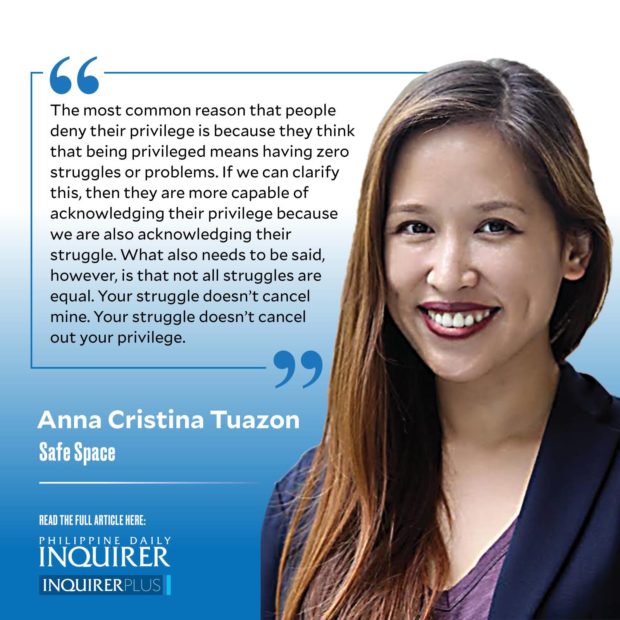Struggle and privilege
Netizens were abuzz when a social media influencer greeted the new year by wondering why people aren’t happy to be returning to work and that, instead, they should be grateful for it. When called out, said influencer seemed to double down by posting a long essay accompanied by numerous pictures detailing her own struggles and adversity that led her to espouse gratitude for work (causing netizens to dub her the “patron saint of labor and employment”). My gut reaction to this: I don’t think she knows why people were upset to begin with.
We’ve seen this online interaction before. A person posts something that’s out of touch with the socioeconomic reality of many. Online outrage ensues. Said person then doubles down and says, “Hey, I struggle too!” In the US, this is currently playing out with the “nepo baby” issue, where people are calling out the children of Hollywood celebrities for their unfair advantage in the industry. This was further crystallized by New York Magazine’s controversial “Year of the Nepo Baby” cover. While some affected celebrities admitted to ease of access due to who their parents were, some insisted on highlighting their struggles on having to prove that they were worthy of their lineage. We can even go further back to Trump, who considered himself a self-made billionaire because he was only given a mere $1-million loan by his father, also a real estate developer. The issue here is about the refusal to acknowledge privilege, which we can simply define as any unearned advantage (e.g., parents, citizenship, physical attractiveness, etc.). What, then, is it about the privileged and their use of struggle as self-defense?
I’ve gone back and forth numerous times on whether I would write today’s topic, mostly because I felt that I’ve already touched on aspects of this theme in previous articles such as toxic positivity (see “Good vibes only,” 10/6/22) and how to take in criticism (see “‘Winarak’ and the misuse of emotions,” 8/25/21). However, I feel there is still much to be said that will lead to productive discourse instead of just cathartic takedowns of celebrities and public figures. When explaining my idea for the article to a friend, in that I wanted to say something that would actually get a person to reflect on their privilege instead of getting defensive, he asked, “How do you talk to someone like that and make them realize what they said was wrong?”
The first—and necessary—step, in such a conversation, is to validate the other. No good change happens without it. If the person felt judged and misunderstood, they will just have an overriding urge to justify and explain themselves. They will not prioritize listening to others if they feel attacked. And if they hold significant privilege, they can afford to ignore you and avoid reflecting on themselves. We should, of course, not validate everything; only the valid. In this case, we can validate that everyone experiences struggle. Even the richest and most powerful person in the world has struggled at one point in their life. We can also acknowledge the effort they have put in toward their achievement. The most common reason that people deny their privilege is because they think that being privileged means having zero struggles or problems. If we can clarify this, then they are more capable of acknowledging their privilege because we are also acknowledging their struggle. What also needs to be said, however, is that not all struggles are equal. Your struggle doesn’t cancel mine. Your struggle doesn’t cancel out your privilege. Your experience cannot replace others. These are hard but essential truths when working with privilege.
The next step is to make clear what is causing hurt and upset among many, which is ironically the same thing that has caused defensiveness among the privileged: the invalidation of one’s experience. It is not just privilege alone that hurts others, but more so the gaslighting that privilege did not play a significant role in their success. This indirectly accuses the less privileged of simply not working hard enough or not being grateful enough. Any responsible apology must acknowledge that one has invalidated someone else’s experience and feelings. Any apology that starts with “I’m sorry you were offended” further invalidates the receiver by indirectly accusing them of merely being “sensitive.” Another variant of this is “I’m sorry you misunderstood what I meant” which again places fault at the receiver’s capacity to comprehend. Do not be sorry for how other people felt; be sorry for what you did. What I would suggest instead is to start with “I’m sorry that I did not consider other people’s experiences and situations before imposing my views on them.” A sincere apology also doesn’t defend, but promises to do better. Do not muddle your need to be understood with your responsibility to make amends. To misquote Spider-Man, with great privilege comes great responsibility.
—————–
aatuazon@up.edu.ph





















